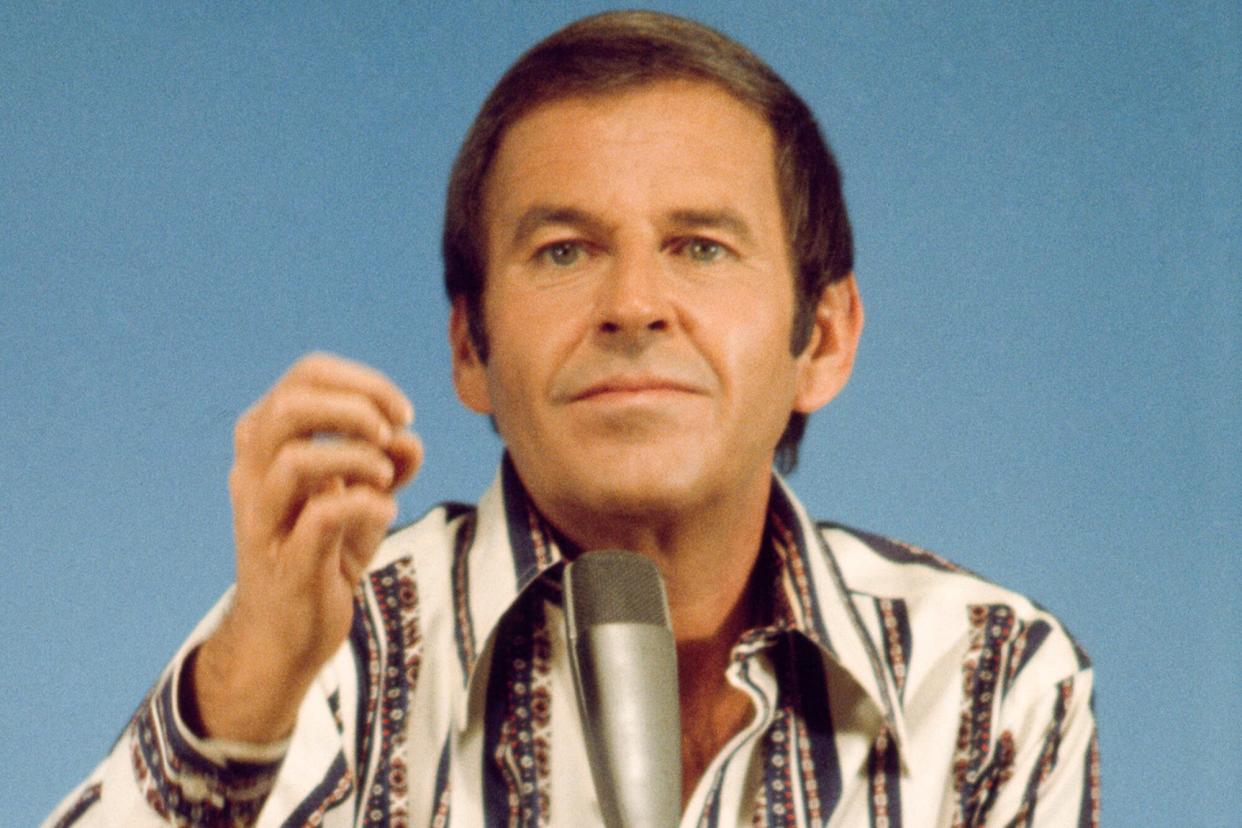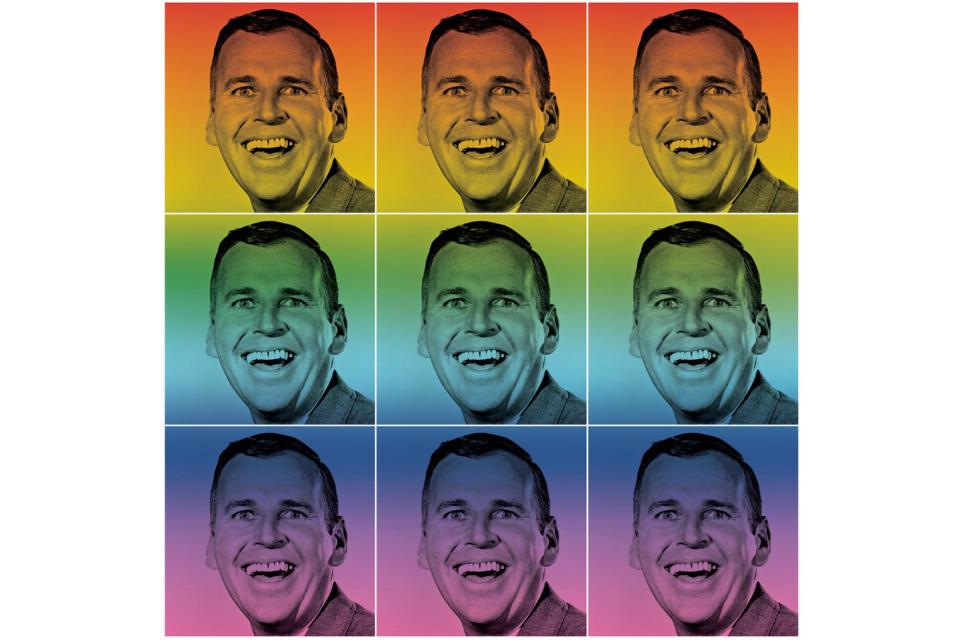The mad, sad, totally fab life of Paul Lynde

- Oops!Something went wrong.Please try again later.
- Oops!Something went wrong.Please try again later.
NBCU Photo Bank/NBCUniversal via Getty Images
"I'll take Paul Lynde."
Not so very long ago, a lifetime ago, those words took Americans somewhere wicked. In the '70s, if that sentence was uttered by a contestant on Hollywood Squares, lights would flash around the center cube in a grid of celebrities — those of the stripe who wind up on game shows — and settle on a genuine star. He was tanned, with shining teeth, if no leading man. He was in his 40s but looked older, and he had a whinnying snigger. But when it came to providing risqué answers to questions posed by the NBC show's host, Peter Marshall, he could not be matched.
Is the electrical current in your house AC or DC?
"In my house, it's both!"
Does Mark Spitz believe it's easier to swim nude?"
Well, it's easier to steer..."
You're the world's most popular fruit. What are you?
"Humble."
The audience would roar approval at his bawdy jokes, and Lynde would flash his Cheshire-cat grin. He delivered that performance thousands of times in the 14 years after the show's 1966 premiere. Between Lynde's center-square residency and his guest spots on sitcoms and variety shows, the actor was booking up to 200 televised hours each season by the mid-'70s. It made him rich enough to buy Errol Flynn's L.A. mansion, where he lived with his dog, a terrier named Harry. "There was no one funnier than Paul Lynde," says Whoopi Goldberg, who took over the center square in the Hollywood Squares revival that premiered in 1998. "I don't know if the public thought about his sexuality."
Being gay was the secret of Lynde's success, even though it was a (half-hearted) secret. He hid his truth in plain sight, reveling in a camp persona. All these years later, people still don't know what to make of him. Lynde's brilliance was rooted in gayness, but he was deeply conflicted about it. "Paul's following was mostly straight," says Cathy Rudolph, author of Paul Lynde: A Biography. "He was afraid if his following was mostly gay, it would open the eyes of his fans that he was also gay and that would end his career."
Lynde was both a role model and a walking stereotype. There was no one else quite like him on any screen. "He was probably the first gay person — whether he was using the word or not — in a lot of people's homes across America," actor-comedian Billy Eichner says. "He was ahead of his time in terms of being as overtly gay as one could be, unlike so many stars of that time."
Lynde was born in Mount Vernon, Ohio. His father was a butcher, and as a child, his only real experience of show business was playing the bass drum at school. When he entered Northwestern University in 1944, Lynde found theater and wowed his drama classmates with witty self-written monologues. After graduation, he moved to New York City and eventually landed his big break in 1960 in the Broadway hit Bye Bye Birdie. Lynde stole the show in the role of harried father Harry MacAfee (after whom he would name his canine companion). Lynde played the role with slightly effeminate blundering outrage — not playing gay, exactly, but not not gay either. He later reprised MacAfee in the 1963 movie version of Birdie, which led to parts in comedies such as Beach Blanket Bingo.
"He was someone whose dog whistle of gay humor little gay kids could hear," recalls Frank DeCaro, The Daily Show veteran, and author. "The turning point in my life, when I went from being the teenage nerd to one of the popular kids, was when I auditioned for a drama club production in 1980 of Bye Bye Birdie by doing my Paul Lynde impression — an impression a lot of little gay kids did in those days."
In 1965, Lynde landed a recurring role as Uncle Arthur on the ABC sitcom Bewitched. "His personality was the same off-camera as it was on camera," says Bewitched director Richard Michaels. "There was nobody really like him; he saw everything as a joke, and it made him a natural." Lynde introduced small-screen audiences to a new kind of trope — a gay-seeming character who wasn't a victim or object of mockery, but a man who fearlessly dished up snark. "He became a pioneer because people were laughing with him, not at him," says Rudolph.
Wealth and fame never made Lynde happy. He drifted from one relationship to another, often with paid escorts, and longed to be taken seriously as an actor. Short-lived attempts were made to build a series around him, such as the 1972-73 sitcom The Paul Lynde Show, which put him in the role of an Archie Bunker-like father. "[Writers] found the humor in him — walking the razor's edge between gay and straight — but it didn't work for a sitcom lead back then," Hollywood Squares producer Les Roberts says. In 1979, a frustrated Lynde briefly quit Squares, feeling his career was literally boxed in, then he waited for Hollywood to offer something better. "He thought somebody's going to call him," Rudolph says. "Nobody did. He ended up going back to Squares."
Justin Bengry, lecturer in queer history at Goldsmiths, University of London, notes that for decades gay characters were always desexualized. "As much as [Lynde's] humor and innuendo played with sexuality, people weren't imagining him seducing someone or having sex," Bengry says. "They were going along with the jokes he is making. But it's interesting that as this camp character he could only be a television personality and never a leading man. But someone like Rock Hudson – who was in that leading role and was sexualized – shielded his sexuality from public view even at the very end of his life as his AIDS diagnosis was being disclosed and discussed."
Lynde's personal life was volatile. The actor was a heavy drinker and infamously cruel when intoxicated. "Every word out of his mouth was venomous, with a sting that really hurt, into every unexpected vulnerability a human might have," musician Jack Holmes said in another biography of Lynde, Center Square by Steve Wilson and Joe Florenski. Lynde's behavior led to public intoxication arrests and an incident where the actor launched into a drunken racist tirade at a Chicago Burger King.
But Lynde believed the most damaging hit to his reputation was when a friend, actor J.B. Davidson, 26, fell to his death after hanging off the balcony of Lynde's room at San Francisco's Sir Francis Drake hotel. When Davidson began to lose his grip, Lynde desperately grabbed his arm but couldn't hold on. The accident was witnessed by two police officers standing outside, who cleared Lynde of wrongdoing. But whispers about the incident dogged him for years. "There were rumors Paul had something to do with it,"
Rudolph says. "When he didn't get roles, he would wonder."
As society changed, Lynde was offered gay parts, but he refused them. In a 1976 People magazine cover story, he said he was glad his following was "straight" and infamously declared, "Gay people killed Judy Garland, but they're not going to kill me." Yet the article also mentioned a friend, Stan Finesmith, described as his "chauffeur-bodyguard." And Rudolph recalls that Lynde privately criticized antigay activist Anita Bryant, saying, "She attacked my people."
"He was, unfortunately, a self-loathing homosexual, so he wasn't exactly a role model in real life," DeCaro says. "But it took balls to do what he did. He provided a lot of hope for a lot of us who are flamboyant."
Lynde remains inspirational to some: RuPaul's Drag Race contestant BenDeLaCreme performed as Lynde during a "Snatch Game" episode in 2018. "Paul Lynde's success was not in spite of, but because of, how queer he was when it could not be spoken," BenDeLaCreme says.
In 1982, Lynde died alone in his bed of a heart attack at the age of 55. Six years earlier, the actor had made an appearance on The Tonight Show during which Johnny Carson asked why Lynde didn't talk about himself more often. The answer was as real as Paul Lynde ever got. "I really don't know — other than I'm absolutely scared," Lynde said. He crossed his arms protectively across his chest. " ... scared of coming out and being myself."

John Springer Collection/CORBIS/Corbis via Getty Images
Related content:

